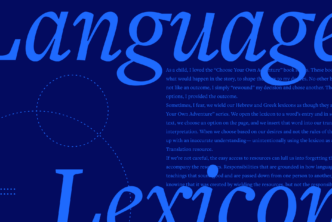I’m going to give you two sets of overlapping opinions on this issue, one set you should listen to and then my own set.
This post is aiming mostly for the person who has no opinions on the issue, and was only dimly aware that opinions existed. You need to know there’s disagreement, and you need to have a basic grasp of why that is.
An Accredited Opinion
For a fully accredited opinion, let’s turn to trained linguist, long-time Greek teacher, published grammarian, and author of an excellent first-year grammar, the late Rod Decker:
The pronunciation of Greek in its various historical stages is debated by scholars. Several proposals have been made. This textbook provides two choices. One is a form of what is called Erasmian pronunciation. This is usually selected for its pedagogical value, not for historical purposes. Some form of Erasmian pronunciation is fairly standard in academic circles. It is not what Greek sounded like in the Koine of the first century, but it has the pedagogical advantage of distinguishing vowel sounds, many of which have similar pronunciations in other systems. Some people think Modern Greek pronunciation should be used to teach Greek, but that is anachronistic and certainly not accurate, though it may be closer to Koine than Erasmian. Others have proposed what is probably a fairly accurate reconstruction of first-century Koine. One of the better-known proposals is Randall Buth’s “Reconstructed Koine” (for further information on this system, including audio material, see his Biblical Language Center). That would be a better option than the modern system, and your teacher may prefer that you use it. If so, see the alternate pronunciation given in chapter 1 along with whatever supplemental materials your teacher may provide.
For students learning to read Koine Greek for academic or ministry purposes, pronunciation is mostly (but not entirely) a convenience. Personally I use a traditional Erasmian system, freely acknowledging that it is not an accurate representation of exactly what Jesus and Paul sounded like when they spoke Greek. If you were learning to speak Greek (either Koine or modern), then pronunciation would obviously be far more important.
Linguists such as Geoffrey Horrocks have done unbelievably detailed work in diachronic linguistics (tracing the form of a language through time) to figure out what the predominant Κοινή pronunciation rules were in given time periods. But Decker basically argues that pedagogical and ministry purposes trump strict accuracy, and I think his advice is sound. That’s a big reason Erasmian pronunciation has stuck around since Erasmus: it has demonstrated its utility, given the church’s most common purposes for learning Greek. Decker contributed to a (pricey) book of essays called Linguist as Pedagogue which deals in greater detail with the issues involved in teaching Greek.
An Overlapping Opinion
Now my idiosyncratic, loosely accredited opinion. By reading on, you agree to the terms and conditions associated with loose idiosyncratic accreditation.
Other things being equal—and they’re not—I would tend to prefer to pronounce μονογενής the way John did and δικαιοσύνη the way Paul did. I think there may be hidden value for textual criticism in the careful study of pronunciation. Just as, to this day, if I produce a typo it’s likely to be a homonym or malapropism of what I meant to say, I believe that some errors of ancient copyists might be more explicable to the amateur textual critic if he or she knew how that copyist pronounced Κοινή.
I also think, though I register Decker’s misgivings (not quoted), that Κοινή Greek should be spoken—or at least read out loud—more often than it is in American classrooms. I think there are hidden benefits for exegesis that come from knowing in one’s bones that Greek Is Not Math.
But there are natural limits to the confidence we can have in the way we’re pronouncing Κοινή. Imagine being a Swahili-speaking scholar in the year 2790, after the Great Conflagration has burned up most English literature. You will be able to provide some answers to the question, “How did English speakers of the 21st century pronounce their O’s and their R’s?” But you may miss out completely on the vocal fry of the Valley girls, the finely articulated drawl of the Charlestonians, and any other kind of dialectical (or idiolectical!) speech that somehow doesn’t survive in archaeological remains.
I applaud those who are resurrecting conversational Κοινή, but at the moment I end up going with my pragmatic American instinct. Erasmian pronunciation makes it easier for English speakers, at least, to learn the language, and there are no native Κοινή speakers around to wince or (as the French are famous for doing) look down their noses at our mistakes. If teaching Κοινή Greek as a spoken language takes off, I’ll be glad to amend my opinion. But for now I’ll stick with the tried, even if we know it’s not true.




